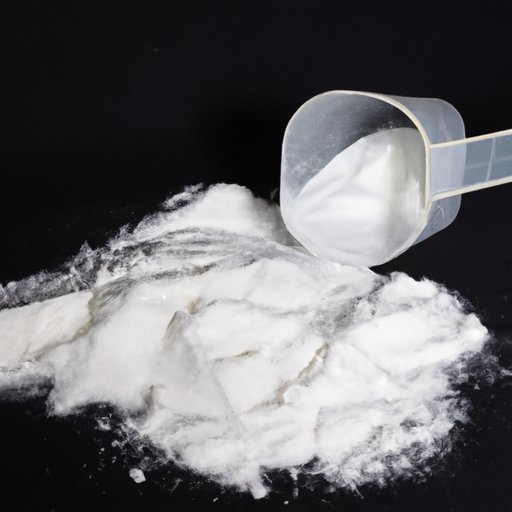
Introduction
Many fitness enthusiasts know about creatine and its benefits in building muscle mass. However, there is much debate surrounding the association between creatine and water weight. Most people call it “creatine bloat,” and it has become a hindrance to performance measured by physique.
In this article, we explore the link between creatine and water weight. We look into the scientific study, demystify the connection, and explain what happens to the body during creatine supplementation. We also examine how to differentiate between gains in muscle mass and water weight gains, and we evaluate the pros and cons of creatine supplementation. Lastly, we provide tips to maximize benefit and minimize water weight.
Demystifying the Creatine and Water Weight Connection: What Science Says
Creatine is an organic compound that is produced naturally in the body, primarily in the liver. It helps in the production of adenosine triphosphate (ATP), which for muscle contraction and energy. During exercise, muscles use ATP for energy and if those levels run low, that’s when fatigue sets in.
Supplement companies, however, have isolated creatine and sold it as a supplement. It has become a popular commodity for bodybuilders and athletes looking to enhance their performance.
Studies have shown that creatine supplementation increases muscle creatine content by around 20 percent, resulting in a sizeable improvement in strength and power output. A meta-analysis of 22 studies showed that creatine supplementation significantly increased body weight and fat-free mass compared to placebo.
The Truth Behind Creatine and Water Retention: What Happens in Your Body
When you take creatine, it pulls water into your muscle cells. This is why there is a sudden bump in weight when you first start creatine supplementation. That being said, retaining water is necessary for muscle growth. It increases cell volume, which triggers a cascade of events that lead to increased protein synthesis to promote muscle growth.
While water retention in the muscles can positively affect muscle growth, it can also be unpleasant to deal with subcutaneous water retention, caused by increased water storage under the skin. This may lead to a “puffy” appearance, which can result in body dysmorphia and body image issues.
Are Your Gains Real or Just Water Weight? Understanding the Role of Creatine
It’s natural to worry about whether your weight gain after starting creatine supplementation is a result of genuine muscle growth or merely water retention. The best way to differentiate between the two is by monitoring your body composition regularly.
If you notice an increase in lean mass and muscle strength while supplementing with creatine, that indicates genuine muscle growth. On the other hand, if your weight gain does not correspond to an increase in muscle strength or lean mass, it is probably water retention.
But this doesn’t mean that water retention is avoidable. Creatine remains a crucial element in the process of muscle growth, and water retention in the muscles is a by-product of it.
Exploring the Link Between Creatine and Water Weight: Pros and Cons
Before deciding whether to supplement with creatine, it’s essential to understand both the advantages and disadvantages of doing so.
The advantages of creatine supplementation include improved strength, muscle mass, and power output. It also helps in the prevention of muscle damage, enhances recovery, and increases glycogen in the muscles.
However, creatine supplementation does have some potential drawbacks, such as gastrointestinal discomfort and dehydration. Long-term high doses of creatine may also cause damage to the liver and kidneys, although more studies are needed to confirm this claim.
Maximizing Creatine Benefits While Minimizing Water Weight: A Guide
To minimize water retention while taking creatine, proper hydration is crucial. Individuals may need to drink more than their usual amount of water since kidneys regulate how the body maintains fluid balance. Also, proper dosing is essential as larger doses can lead to more water retention.
Furthermore, like with any dietary supplement, it’s best to follow a diet and training plan tailored to your goals and to supplement with creatine according to the instructions on the label.
From Bloat to Bulk: The Complex Relationship Between Creatine and Water Retention
The complex relationship between creatine and water weight lies in the psychological impact it has on individuals. It can lead to body dysmorphia, body image issues, and anxiety. However, it’s important to remember that water retention is essential for muscle growth, and it’s a necessary by-product of the process.
To deal with creatine bloat, you may try several strategies, such as taking diuretics or including natural diuretics in your diet like asparagus and parsley. Also, focusing on body composition changes rather than weight scales can help reduce anxiety.
Conclusion
In conclusion, creatine and water weight have a complex relationship. Water retention is a by-product of the process of muscle growth and is usually the reason for weight gain due to creatine supplementation. Proper hydration and dosing can minimize water retention, and a tailored diet and training plan can optimize benefits while offsetting any downside to minimize health risks.
As with any dietary supplement, it’s important to consult a medical professional to find out whether creatine supplementation is appropriate for you. Ultimately, it’s up to the individual to make an informed decision about whether creatine supplementation is right for them.
Final Thoughts
While there is much debate surrounding the effects of creatine and water weight, understanding the relationship between the two can be beneficial for fitness enthusiasts. The link is complex, and care should be taken when supplementing with creatine to maximize benefit while minimizing water retention. With proper dosing, hydration, and monitoring, creatine supplementation can increase muscle mass, strength, and power output, and help you achieve your fitness goals.





